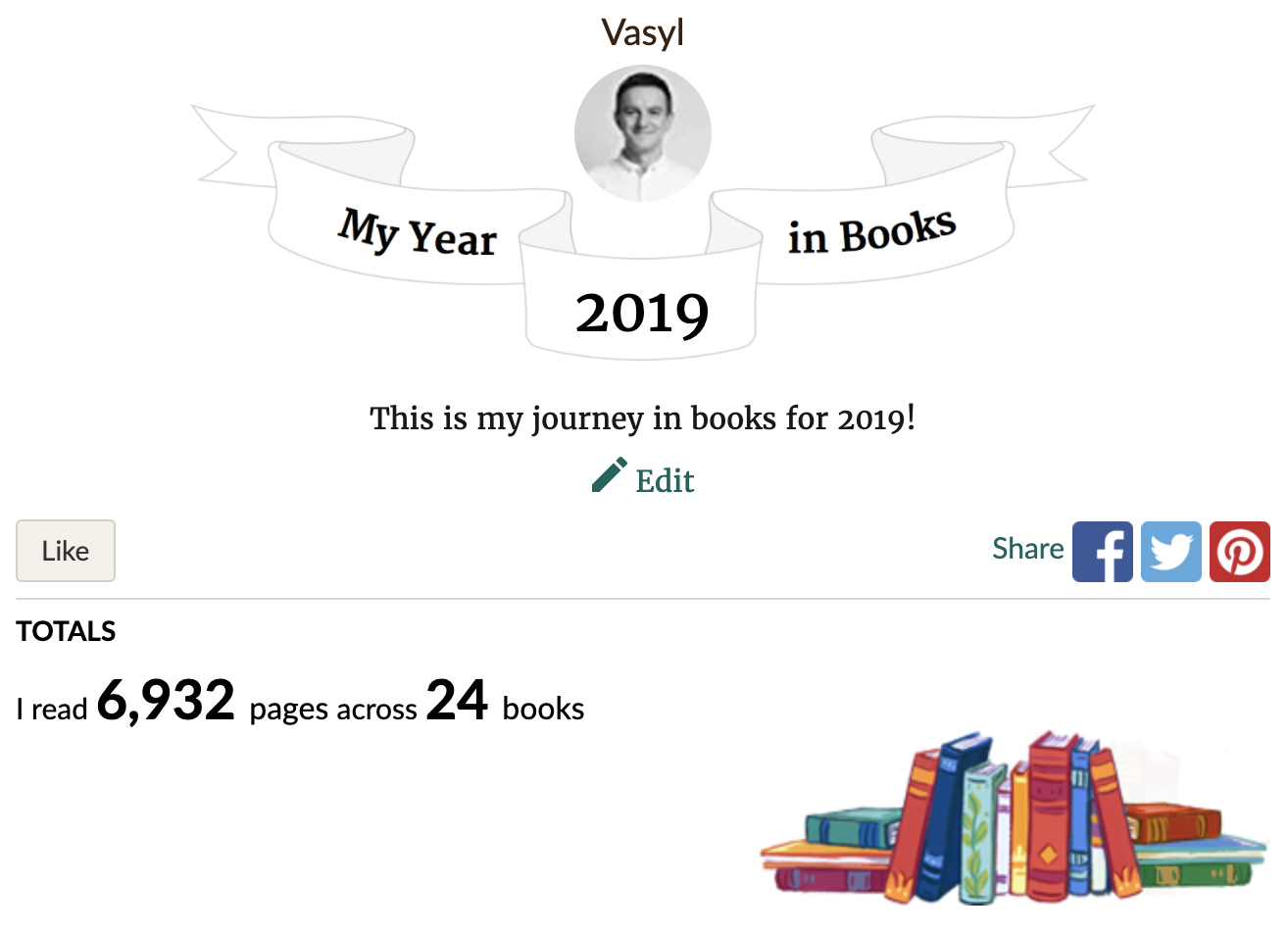
When you accept a reading challenge, you are inclined to choose smaller books for your achievements.
When I think about my reading habits, “chaos” — is the only word that comes to my mind. Reading for me is fun, education, self-development, and time-wasting at the same time.
Books serve as a universal tool for all occasions, some kind of an old-school smartphone. No matter what kind of book it is, I like reading them all… and without any planning. This is very important. I can’t plan anything in reading.
Unfortunately, my romantic relationship with books was totally destroyed by a New Year’s Goal Setting. Yes, I decided to accept a reading challenge at Goodreads.com
A couple of words about Goodreads.com. This is a social media cataloging website that allows users to create their own reading list, make reviews, and share them with friends. The most destructive function, as for me, is setting goals, tracking reading activities, and competing with other readers.
It’s like, they invented a new kind of sport — reading and you can compete with your own kind… in reading.
It’s proposed to set up your reading goal in a number of books you are willing to read during a year. There are two indicators that showcase your achievements — books read and pages read.

I was exposed to the general hysteria of increasing personal efficiency and set a reading goal for 2020–28 books to read. So, let’s start reading. The first 5 books felt enjoyable as usual. But, then I started feeling some pressure.
First I started calculating the number of books I have to read monthly to complete the goal. Next, I prioritized smaller books over more interesting for me at a particular moment. Speed of reading over quality and satisfaction — was my third unpleasant find.
When I’d read ten books, I decided to rethink my goals and made some calculations. I was surprised to find out that last year I read 24 books, without any pressure.
What about the numbers of pages, you tend to choose the easier path, meaning you choose smaller books to read. The average number of pages per book in 2019 (non-challenge year) was — 289 pages and only 251 in my super winning 2020 year. WOW, what a surprise, the challenge makes me read 15% smaller books.
I find the destructive force of my challenge: it makes me feel in a hurry and influences my choice of books. Period.
Am I alone here? Let’s discover. The technical part starts here.
I am planning to collect reading data about as many Goodreads users as possible. Goodreads has pages with needed two numbers: books read and pages read.
The page with my 2019 data looks like that:

The page URL: https://www.goodreads.com/user/year_in_books/2019/28524640
Where the last number is a user ID, 28524640 is mine.
https://www.goodreads.com/user/year_in_books/ — a standard challenge URL.
So the URL has two variables — a User ID and a year. User IDs are 8 digits numbers and I thought to generate them randomly. The approach is not efficient at all. Thankfully to my Search engine optimization experience, I discovered a sitemap of Goodreads.com and files related to the website users only, for example:
Gotcha, I fount users needed for my analysis, half a million users’ URLs, in general, were found this way. The next step is to scrape data with R using the Rvest package. The code I am going to share in a separate article.
I scraped more than 14K pages and found 1,2K active readers, people who read at least one book in 2019. I repeated the scraping procedure for the past 4 years, 2016, 2017, 2018, and 2019.
According to the data, I segment users into three groups:
- Premier league — active readers with completed challenges.
- The first league — they committed challenges but failed to complete.
- Backyard league — readers without commitments, this is my field. I felt great reading everything I like and as much I can.
The data below tells us that 50% of all active readers don’t set goals, quite reasonable as for me. The Premier League players are 21% of all readers. ~60% of readers can’t complete their goals and roll into the First League by the end of the year.

I know that this is not the best experience — to fail personal goals. I feel terrible about that, this is why I feel so much pressure completing my reading challenge.
Goals are usually set at the beginning of a year, dreaming to have the most productive and successful year ever. But life is unexpected and full of pleasant surprises, which change our plans. More than 60% of reading goals are not competed destroying reading experience totally.
This visual’s data is inclusive of challenge and non-challenge readers. It shows that despite the challenge acceptance, readers who are strongly willing to complete their challenges choose 11% smaller books.
It’s almost certainly true that the Premier League readers read many more books, probably they have a reason doing so. But… how much fun they have is hard to say.
All that said, my fear of reading quality while challenging is entirely reasonable. I am not the only person struggling with that pressure and I am definitely going back to my chaotic reading habit.
